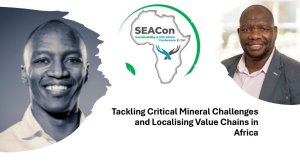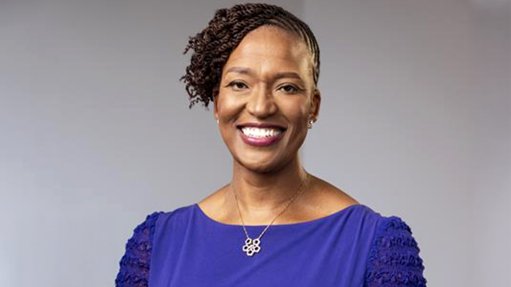Africa’s critical minerals moment about strategically charting a sustainable future for the continent

Panelists provide deep insights into how Africa, and particularly South Africa, can capitalise on the global critical minerals race
Africa’s wealth in critical minerals, such as cobalt, manganese, lithium and rare earth elements, offers a once-in-a-generation opportunity to pivot from raw commodity exporter to industrial power. But seizing this opportunity requires more than mineral endowment. It demands coordinated policy, infrastructure, skills development, and the strategic localisation of value chains. These were the key themes unpacked during a recent Sustainability and ESG Africa Conference (SEACon) webinar, hosted in partnership with Creamer Media Webinars.
Moderated by SEACon director Wendy Poulton, the session featured CNV International program officer and critical minerals lead for South Africa Shane Choshane and Industrial Development Corporation (IDC) senior industry specialist for industry planning Kgashane Mohale, who provided deep insights into how Africa, and particularly South Africa, can capitalise on the global critical minerals race.
Choshane emphasised that the concept of “critical minerals” is deeply geopolitical. Europe and the US, in seeking to reduce reliance on Chinese supply chains, have introduced their own legislation, such as the EU Critical Raw Materials Act, to secure access to minerals, many of which are abundant in Africa. But this positioning has left African nations on the back foot, exporting raw minerals while importing finished products at a premium.
For South Africa, which holds vast manganese and platinum group metal reserves, the challenge is clear: shift from being a supplier of raw ore to a producer of value-added products. “Without policy certainty, without strategy, we remain trapped in extractivism,” Choshane warned.
Realistic Industrialisation
While full localisation of entire battery or electric vehicle supply chains may be unrealistic in the short term, Mohale outlined the IDC’s pragmatic strategy. “We aim to build the next step—either downstream or upstream—in the value chain,” he explained. For example, a new IDC project in South Africa is exploring the manufacture of nickel-manganese-cobalt (NMC) powder, even though the cobalt will be imported and the final product exported.
Rather than waiting for the perfect ecosystem to emerge, the IDC’s approach recognises the need to tap into global markets while building local capacity one segment at a time.
Skills, Infrastructure, Integration
Industrialisation cannot occur without people. But decades of deindustrialisation and declining STEM education have left South Africa with significant skills gaps. “We need to rethink our education system to produce flexible, broad-based skills,” Mohale argued, noting that private sector upskilling, international collaboration, and reskilling of workers (such as from the coal sector) are crucial short-term levers.
Infrastructure, especially electricity and transport, was also flagged as a major constraint. Without addressing these basics, South Africa cannot attract or retain manufacturing investment.
Moreover, continental collaboration is key. Both speakers stressed the need for regional integration, such as leveraging the African Continental Free Trade Area, and potentially aligning African trade positions through bodies like the African Union.
Circular Economy and Environmental Risk
As the energy transition accelerates, demand for critical minerals is projected to outstrip supply by 2035. This raises the importance of recycling and the circular economy.
“Recycling metals is a form of secondary mining,” Choshane explained. But Africa’s ability to participate in this space is limited without local processing facilities.
Environmental concerns also loom large. Critical mineral mining brings with it the risk of pollution, tailings dam failures, and community displacement. These issues, said Choshane, must be central to future policy and regulatory reform, not an afterthought.
The webinar closed on a sobering but energising note: Africa must act with speed and strategy. It must choose how to leverage its mineral wealth, not just to earn royalties but to build industries, develop skills, and drive inclusive growth. “The world won’t wait for us,” Mohale said. “We need to fire on all cylinders, from education to policy to trade.”
As the world races toward decarbonisation, Africa’s mineral wealth offers a generational opportunity. Whether it results in sustainable prosperity or remains another extractive boom depends entirely on the choices made today.
Article Enquiry
Email Article
Save Article
Feedback
To advertise email advertising@creamermedia.co.za or click here
Press Office
Announcements
What's On
Subscribe to improve your user experience...
Option 1 (equivalent of R125 a month):
Receive a weekly copy of Creamer Media's Engineering News & Mining Weekly magazine
(print copy for those in South Africa and e-magazine for those outside of South Africa)
Receive daily email newsletters
Access to full search results
Access archive of magazine back copies
Access to Projects in Progress
Access to ONE Research Report of your choice in PDF format
Option 2 (equivalent of R375 a month):
All benefits from Option 1
PLUS
Access to Creamer Media's Research Channel Africa for ALL Research Reports, in PDF format, on various industrial and mining sectors
including Electricity; Water; Energy Transition; Hydrogen; Roads, Rail and Ports; Coal; Gold; Platinum; Battery Metals; etc.
Already a subscriber?
Forgotten your password?
Receive weekly copy of Creamer Media's Engineering News & Mining Weekly magazine (print copy for those in South Africa and e-magazine for those outside of South Africa)
➕
Recieve daily email newsletters
➕
Access to full search results
➕
Access archive of magazine back copies
➕
Access to Projects in Progress
➕
Access to ONE Research Report of your choice in PDF format
RESEARCH CHANNEL AFRICA
R4500 (equivalent of R375 a month)
SUBSCRIBEAll benefits from Option 1
➕
Access to Creamer Media's Research Channel Africa for ALL Research Reports on various industrial and mining sectors, in PDF format, including on:
Electricity
➕
Water
➕
Energy Transition
➕
Hydrogen
➕
Roads, Rail and Ports
➕
Coal
➕
Gold
➕
Platinum
➕
Battery Metals
➕
etc.
Receive all benefits from Option 1 or Option 2 delivered to numerous people at your company
➕
Multiple User names and Passwords for simultaneous log-ins
➕
Intranet integration access to all in your organisation



















